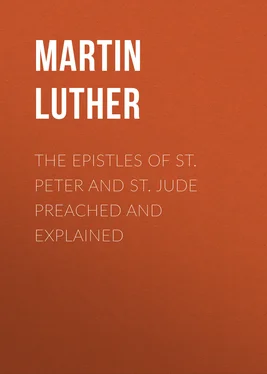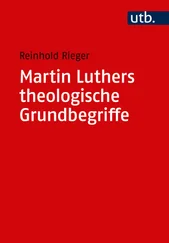Martin Luther - The Epistles of St. Peter and St. Jude Preached and Explained
Здесь есть возможность читать онлайн «Martin Luther - The Epistles of St. Peter and St. Jude Preached and Explained» — ознакомительный отрывок электронной книги совершенно бесплатно, а после прочтения отрывка купить полную версию. В некоторых случаях можно слушать аудио, скачать через торрент в формате fb2 и присутствует краткое содержание. Жанр: foreign_prose, foreign_religion, Философия, foreign_psychology, foreign_antique, на немецком языке. Описание произведения, (предисловие) а так же отзывы посетителей доступны на портале библиотеки ЛибКат.
- Название:The Epistles of St. Peter and St. Jude Preached and Explained
- Автор:
- Жанр:
- Год:неизвестен
- ISBN:нет данных
- Рейтинг книги:5 / 5. Голосов: 1
-
Избранное:Добавить в избранное
- Отзывы:
-
Ваша оценка:
- 100
- 1
- 2
- 3
- 4
- 5
The Epistles of St. Peter and St. Jude Preached and Explained: краткое содержание, описание и аннотация
Предлагаем к чтению аннотацию, описание, краткое содержание или предисловие (зависит от того, что написал сам автор книги «The Epistles of St. Peter and St. Jude Preached and Explained»). Если вы не нашли необходимую информацию о книге — напишите в комментариях, мы постараемся отыскать её.
The Epistles of St. Peter and St. Jude Preached and Explained — читать онлайн ознакомительный отрывок
Ниже представлен текст книги, разбитый по страницам. Система сохранения места последней прочитанной страницы, позволяет с удобством читать онлайн бесплатно книгу «The Epistles of St. Peter and St. Jude Preached and Explained», без необходимости каждый раз заново искать на чём Вы остановились. Поставьте закладку, и сможете в любой момент перейти на страницу, на которой закончили чтение.
Интервал:
Закладка:
Thus all good things are bestowed upon us by the Father, not for any desert of ours, but of pure mercy. These are true Gospel words which are to be preached, but how little—God save us—of this kind of preaching is to be met with in all sorts of books, even those that must be considered the best; how little agreement is there, as St. Jerome and St. Augustine have written, in this position,—that Jesus Christ is to be preached, that he died and rose again, and that he died and rose again that through such preaching men might believe on him and be saved. That is preaching the true Gospel. Whatever is not preached in this wise is not the Gospel, do it who will.
This is now the summa summarum of these words. Christ, through his resurrection, has brought us to the Father; and so, too, St. Peter would bring us to the Father by the Lord Christ, and he sets him forth as Mediator between God and us. Hitherto we have been taught that we should call upon the saints; that they are our intercessors with God, while, moreover, we have had recourse to our dear Virgin, and have set her up as Mediatress, and have let Christ go as an angry judge. This the Scripture does not do; it goes further, and exalts Christ; teaching that he is our Mediator, by whom we come to the Father. Oh! it is a blessing infinitely vast that is bestowed upon us through Christ, that we may go into the presence of the Father and claim the inheritance of which St. Peter here speaks.
These words also well exhibit the feelings which the Apostle had, as with the deepest reverence he begins to praise the Father, and would have us adore and bless Him for the sake of the infinite riches which He has bestowed upon us, in that He has begotten us again, and this, too, before we had desired or sought it; so that nothing is to be praised but pure mercy, in order that we may not make our boast of any works, but confess that we hold all that we have of God's compassion.
There is no more the law and vengeance before us, as heretofore, when He affrighted the Jews so that they were forced to flee, but dared not go toward the mount. He vexes and chastises us no more, but shows us the greatest friendship, creates us anew, and appoints us, not to do some work or works, but produces within us an entirely new birth and new being, that we should be something different from what we were before, when we were Adam's children,—namely, such as are transplanted from Adam's heritage into the heritage of God; so that God is our Father, we are His children, and thus also heirs of all the good which He possesses. Observe with what emphasis the scriptures present this matter; it is all a living, not a vain, matter in which we are concerned. Since we are thus begotten again the children and heirs of God, we are equal in honor and dignity with St. Paul, St. Peter, our blessed Virgin, and all the Saints. For we have the treasure and all good things from God just as richly as they; for it is just as necessary for them to be begotten again as for us,—therefore they have nothing more than all other Christians.
To a living hope. That we continue to live on earth is mainly to this end, that we should be of service to others. Otherwise, it were better that God should have taken away our breath and let us die as soon as we were baptized and had begun to believe. But He suffers us to live here in order that we may bring others also to believe, doing to them as He has done toward us. But while we remain on earth, we must live in hope; for although we are assured that through faith we have all the good things of God, (for faith brings along with it assuredly the new birth, the adoption, the inheritance, and makes them yours,) still you do not as yet behold them; but the matter exists in hope, while it is of but small importance that we may not see it with our eyes. This he calls the hope of life; that is, by a Hebrew phrase, as though for sinful man we should say, a man of sin. We call it a living hope; that is, one in which we certainly expect, and may be assured of, eternal life. But it is concealed, and a veil is drawn over it, that we see it not. It can only be apprehended in the heart and by faith, as St. John writes in his Epistle, 1 John v.: "We are now the children of God, and it doth not yet appear what we shall be; but we know that when it shall appear that we are like Him, we shall behold Him as He is." For this life, and that , cannot be commingled, cannot consist with one another, so that we should eat, drink, sleep, watch, and do other works of the flesh which this life renders necessary, and at the same time have our full salvation. Therefore we can never arrive at eternal life unless we die, and this present life passes away. Thus, as long as we are here we must stand in hope, until it be God's pleasure that we should behold the blessings that are ours.
But how do we attain to this living hope? By the resurrection of Christ from the dead, he says. I have often asserted that no one can believe on God except through a mediation, since we can none of us treat for ourselves before God, inasmuch as we are all children of wrath; but we must have another by whom we may come before God, who shall intercede for us and reconcile us to God. But there is no other mediator than the Lord Christ, who is the Son of God. Therefore that is not a true faith which is held by the Turks and Jews,—I believe that God has created heaven and earth. Just so does the devil, too, believe, but it does not help him. They venture to present themselves before God without having Christ as mediator. So St. Paul speaks in the fifth of Romans, "We have access to God by faith, not through ourselves, but through Christ." Therefore we must bring Christ with us, must come with Him, must satisfy God by Him, and do all that we have to transact with God through Him, and in His name. That is the thought implied here by St. Peter, and he would also say, we surely expect this life, although we are still on earth. But all comes in no other way than through the resurrection of Christ, since He has arisen and ascended to heaven, and is seated at the right hand of God. For on this account He ascended, in order to bestow upon us His Spirit, that we might be born again, and now through Him might come to the Father and say, "Behold, I come before thee and pray, not because I rely on my own request, but because my Lord Christ has gone before me and is become my intercessor." These are all glowing words wherever there is a heart that believes; where there is not, all is cold and unimpressive.
Hence we may determine what genuine Christian doctrine or preaching is. If the Gospel is to be preached, it must concern the resurrection of Christ. Whoever does not preach this is no Apostle; for it is the head article of our faith. And those books are truly the noblest which teach and enforce such doctrine, as was said above. So that we may easily discover that the Epistle of James is no true Apostolic Epistle 5 5 The well-known views of Luther in regard to the Epistle of James, and the grounds upon which he rejected it from the canon of the New Testament, are presented in this passage. He was too impatient of the seeming contradiction between Paul and James upon the subject of faith, and too hastily concluded that they were irreconcilable. A careful consideration of the scope of the argument in the Epistle of James, removes the difficulty, as may be seen at large in later commentators. There is no historical reason for casting discredit upon the Epistle of James. The early Christian writers furnish very decided testimony in its favor. Clement of Rome has alluded to it twice. Hermas has not less than seven allusions to it, according to Lardner fully sufficient to prove its antiquity. Origen, Jerome, Athanasius, and most of the subsequent ecclesiastical writers quote from it, and it is found in all the catalogues of canonical books published by the general and provincial Councils. But an argument of still greater weight is, the fact that it is inserted in the Syriac version of the New Testament, executed at the close of the first, or early in the second century. None certainly would question that the Jewish believers to whom it was addressed would be the best judges of its genuineness and authenticity, and by them it was unhesitatingly accepted.
for it contains scarcely a letter of these things in it, while the greatest importance belongs to this article of faith. For were there no such thing as the resurrection, we should have neither comfort nor hope, and all beside that Christ has endured or suffered would have been in vain.
Интервал:
Закладка:
Похожие книги на «The Epistles of St. Peter and St. Jude Preached and Explained»
Представляем Вашему вниманию похожие книги на «The Epistles of St. Peter and St. Jude Preached and Explained» списком для выбора. Мы отобрали схожую по названию и смыслу литературу в надежде предоставить читателям больше вариантов отыскать новые, интересные, ещё непрочитанные произведения.
Обсуждение, отзывы о книге «The Epistles of St. Peter and St. Jude Preached and Explained» и просто собственные мнения читателей. Оставьте ваши комментарии, напишите, что Вы думаете о произведении, его смысле или главных героях. Укажите что конкретно понравилось, а что нет, и почему Вы так считаете.












